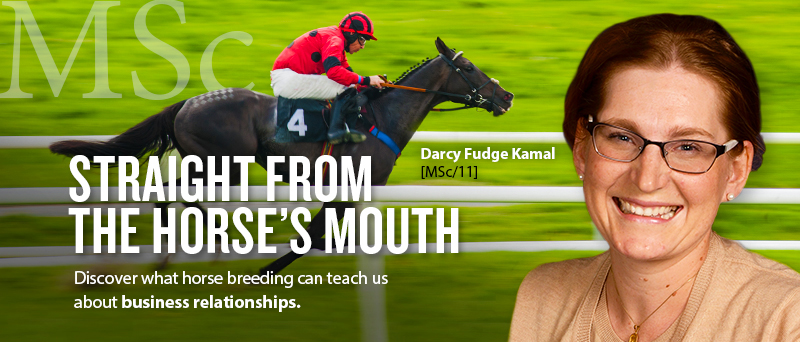
Straight from the horse’s mouth
The truth about trust in business partnerships
What can horses possibly teach us about business?
A surprising amount, says Asper School of Business grad Darcy Fudge Kamal [MSc/11]. Now an assistant professor at the George L. Argyros School of Business and Economics at Chapman University, in California, and a research associate with the Economic Sciences Institute, Darcy is studying the Thoroughbred horse industry to learn more about trust between companies.
“Firms competing against one another often need to collaborate and coordinate to share resources,” she explains. “Sometimes that involves a great deal of trust.”
What happens when that trust is broken and the strategic partnership falls apart? Can the relationship ever be salvaged, and how?
Darcy’s research into the Thoroughbred industry holds some intriguing answers.
“The horse industry (a $102 billion industry in the US alone) is full of small and medium businesses — even multinationals such as Darley and Coolmore — in breeding partnerships with one another,” says Darcy. “Sometimes these relationships end on bad terms, or they have a good idea but the partnership doesn’t work out. What I’m finding in my research is that when those partnerships dissolve, they’re more likely to come back together when the alliance managers can draw on termination experiences without using blame.”
Darcy says her interest in the Thoroughbred industry goes back to growing up in a family business involved in Arabian horse breeding.
“From my childhood, I was left with the impression that trust is very hard to manage in business relationships.”
An early career in the telecom industry only strengthened that impression. At MTS-Allstream, she conducted market research and business intelligence to support the company’s strategic planning. She found that the relationships between telecom firms were as important as the relationships between horse breeders.
Darcy says her decision to pursue an MSc at Asper had a lot to do with her experience there as an undergrad. “During my BComm (Hons), Ed Bruning, a marketing professor, involved me in research projects right away and invited me to present our research at an academic conference in the last year of my undergrad. I became hooked on research and engaged scholarly conversation.”
Under the guidance of Asper professor Parshotam Dass, and the encouragement of Ed Bruning, Darcy focused her thesis on strategic management. She says she was especially impressed by the availability of the faculty and by the MSc program’s interdisciplinary approach, which led to “new ideas and interesting questions.”
Darcy also credits her Asper MSc experience with helping her transition smoothly to the PhD program at the University of Minnesota. “PhD programs recognize the special training in research methods and academic writing that an MSc program like Asper’s provides.”
In spite of her lifelong passion for horses, Darcy says her decision to study the Thoroughbred industry in her current research actually emerged from questions about how best to approach her PhD dissertation.
“I was asked whether I’d be able to find enough data on alliance terminations to pursue my research question as deeply as I wanted. I didn’t know the data existed until I began my fieldwork in Kentucky, but my contacts there helped me discover that the Thoroughbred industry is an ideal dataset to study the questions I’m interested in.”
Darcy says it surprised her to discover how little the business side of the industry has to do with horses, and how much it has to do, ultimately, with people.
“Most people find their way into this industry because of their passion for horses, but their career success depends on hard work and managing relationships. Ironically, this was why I decided not to go to vet school when I graduated high school. A veterinarian told me that managing relationships with people is essential to becoming a good vet. I’ve been studying trust in business relationships ever since.”






